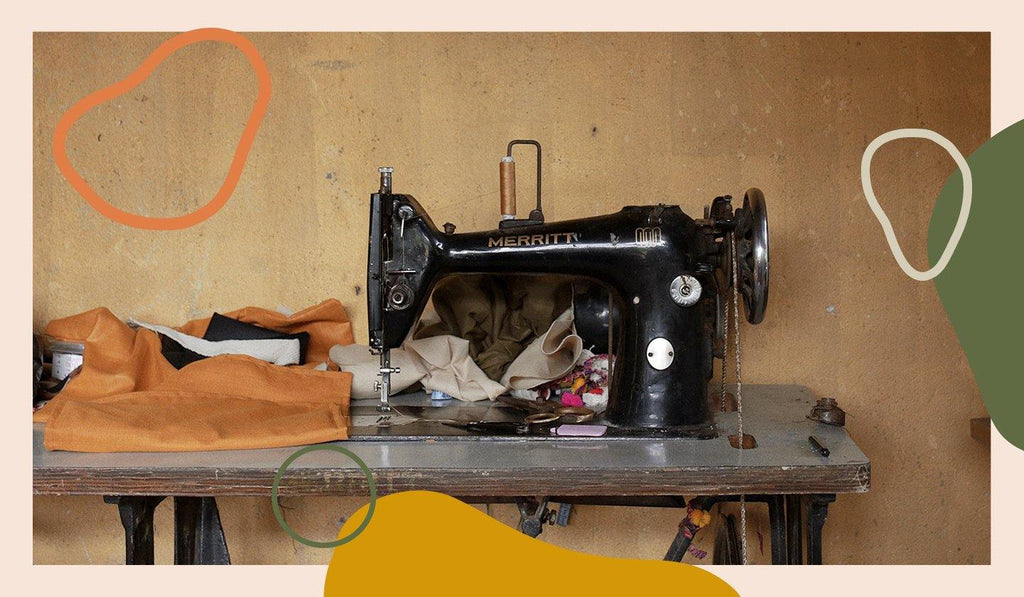
As you already know about the women who make our products and our efforts to support them through education, we want to take a few steps back and show you how our products’ journey began. When Project Três started in 2016, the priority was to create new economic opportunities for our women and to cover their basic needs. Once we could provide them a safe environment, food, healthcare, and education we were able to evolve and implement more sustainable practices across the whole chain. The material choice has a big impact across the supply chain as it can decide for up to 95% of a product’s environmental impact. We’ve made significant gains towards sustainability over the last four years as we continue to reduce our environmental footprint. We try to be as sustainable and responsible as possible. However, there is still a long way to go. For us at Project Três, sustainability isn’t a label or a trend, it’s a journey that we would like to share with you.
2016: All the accessories were made of recycled scrap wood.
2017/2018: We started using fabric from the local markets and upcycled materials. At this point, we didn’t use organic cotton or any other conscious or fair trade item.
2019: We transitioned to only fair trade, organic, upcycled, and leftover materials from brands in the areas around the project.
By the end of 2019:
- We started using only fair trade, organic, upcycled, and leftover materials from locally sourced brands. In India, we reached a significant milestone by adopting a zero-waste approach: all the discarded fabric scraps are used as filling in our stuffed animals, made with patterns carefully designed to generate as little leftover materials as possible. Unfortunately, most of the discarded textiles don’t have the same destination. On a global scale, 80% end up in incinerators or landfills, causing huge environmental damage by emitting greenhouse gases in the atmosphere as it decomposes.
- Also, we managed to reduce plastic use in our packaging. The items are wrapped in paper packaging with postcards and tags made from 100% recycled and biodegradable paper. In addition, we keep defective sarees* out of the landfills by upcycling them into reusable packaging pouches. We want to challenge the culture of disposable fashion by extending the life cycle of the materials and giving them a new purpose.
*Traditional garment worn by Indian women
We are committed to eliminating plastic in all our packaging by the end of 2020.
Suppliers and sources
Our suppliers are mostly sourced locally so we can build trustworthy partnerships, support the local economy, and reduce our carbon footprint by cutting down shipping emissions and the need for storage. We seek partners who share our values of sustainability and accountability.
Recycled cotton from leftovers/Organic cotton
Source: Goa, India
All the recycled cotton we use in the project is donated by local brands and individuals where our project operates in Goa. One of our biggest supporters and donors when it comes to materials is Studio Tia, an Indian brand of sustainable handmade clothing. They have donated all their leftover fabric to Project Três since March 2019.
Organic Aloe Vera fabric
Source: Bangalore, India
Our Aloe Vera fabric is provided by Fair Konnect, a Sustainable & Fair Trade organization based in Bangalore. The Aloe Vera fabric is 100% recyclable and biodegradable, using natural fibers and plant-based dye. Besides having a super soft touch, it also nourishes the skin by releasing medicinal properties - it’s basically a spa in a scarf!
Dead stock + Sustainable natural dyes
Source: Rajshahi, Bangladesh
In September 2019, we started working with Thanapara Swallows, a well-known organization of fair fashion. Currently, they are our biggest material supplier. We buy from their dead stock the fabrics that are harder to be sold, since they don’t have huge availability. Everything made by them is fair trade and naturally dyed or AZO free*.
*Free of toxic and allergic compounds that can be harmful to humans or the environment
T-shirts
Source: Kolkata, India
Our t-shirts are made out of organic fair trade cotton and printed with non-toxic and water-based ink. The t-shirts are screen-printed in India in collaboration with Freeset Global, a social enterprise in Kolkata providing support to sex traffic survivors.
Recycled Sarees
Source: Goa, India
The recycled sarees from the ladies in the Project were the first upcycled items we introduced to our practices in 2017. We use them in our packaging, for wholesale packaging sales, and in our Surya sunglasses cases. Today, we buy sarees that have small printing defects from the local market in Goa. Usually, those pieces end up in landfills.
Earrings and Keychains made of recycled and broken jewelry
Source: Goa, India
Our earrings have a silver/brass base and are made of recycled glass beads. The green and red color from our collection are created with donated broken jewelry, which we disassemble and turn into new earrings. We also use recycled beads to create our beaded tassel keychains. These pieces are not only beautiful and sustainable but also very unique and one of a kind.
Ria Silver & Glass Beads Earrings
Farida Handmade Key Chains / Shells
Farida Handmade Key Chains / Tassels
Bracelets
Source: Nairobi, Kenya
This item was introduced in the Project because it was the fastest way to create jobs for our women in Kenya. They already had hair braiding skills, so it was an easy transition to teach them to make beautiful bracelets. The cord of our bracelets is made of polyester, which is not a sustainable option. The issue is that Nairobi is a difficult location for sourcing materials, therefore we had to choose either an environmentally friendly option coming all the way from abroad or buying locally the current material.
Aisha Handmade Bracelet
Fredy Handmade Bracelet
Milli Handmade Bracelet
Mwana Handmade Bracelet
Set Mary - 3 Mixed Bracelets
Soapstone
Source: Kisii, Kenya
Soapstone is commonly found in southwestern Kenya. It’s a natural, metamorphic rock and also a great eco-friendly option as it can be recycled. The first time we developed products in Nairobi, our founder Carla visited one specific supplier in Kisii, 9 hours away from the capital, to ensure our soapstone is fair trade and free of child labor or unfair working conditions. In Kisii, the stones are carved by hand, washed and polished to make them smooth and uniform. Once they get it in Nairobi, our women are ready to work on them and create unique designs. The responsible for introducing and teaching the soapstone art to our mamas was the teacher James Obaigwa, our friend and partner.
Aisha Soapstone Plate
Brenda Soapstone Short Cup
Lucy Soapstone Soapdish Big
Milli Soapstone Big Box
Milli Soapstone Small Box
Rosie Soapstone Plate
Trisha Soapstone Bowl
Violet Soapstone Long Cup








